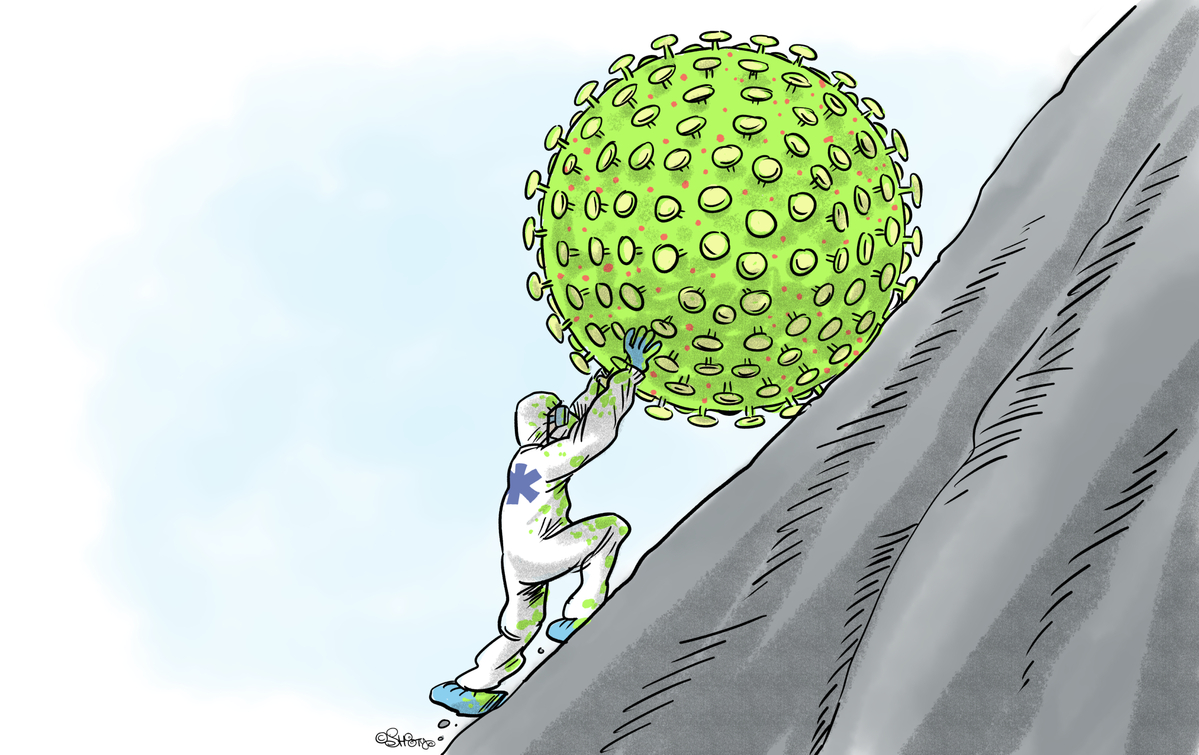Global cooperation best way to defeat coronavirus
By Wang Lei | China Daily | Updated: 2020-07-18 09:01

The World Health Organization recently said there are no signs of the novel coronavirus pandemic being brought under control globally anytime soon, and warned that the pandemic has entered a "new and dangerous phase" of accelerated transmission.
The highly infectious and harmful virus has caused the biggest public health crisis humankind has faced in the past century. Nearly six months have passed since the COVID-19 pandemic broke out, but infections are still revealing new facts about the virus, adding to the knowledge of researchers and medical workers. Which means more efforts are needed to develop an effective COVID-19 vaccine.
But the pandemic, which has been politicized by some countries' leaders, is much more than a global public health crisis. Turning a blind eye to the outbreak's effects on public health and life, some governments have ignored the experiences of China's control and prevention measures in their quest to pursue economic growth, which has worsened the pandemic situation in their countries.
Through their racist and extremely prejudiced remarks and actions, some countries' politicians have even tried to use the pandemic to fulfill their geopolitical goals, seriously undermining global cooperation in the fight against the virus and creating a "politically toxic" atmosphere that is more dangerous than the pandemic itself.
The pandemic has affected the economic growth of all countries. The International Monetary Fund and other global institutions have lowered their global growth forecast for this year several times. In fact, the growth rate of almost all countries is likely to be negative-with China being the only major country likely to register positive growth, according to the IMF.
All countries have taken measures to contain the virus and pursue economic development. But since they have to strike a delicate balance between containing the virus and pursuing economic growth, they have less room for policy maneuvering. Also, the pandemic has made it difficult for countries to coordinate their policies and deepen cooperation on prevention and control measures. And given the possibility of new clusters of infections breaking out in some countries and regions, the global fight against the virus has become even more challenging.
Moreover, due to the increasing economic pressure, many countries have relaxed their prevention and control measures, even lifted the lockdowns before schedule despite the pandemic situation being serious. What they do not realize is that accelerated flows of people and goods will increase the possibility of repeated outbreaks of the pandemic.
Global cooperation in the fight against COVID-19 was more or less successful initially, but now it faces uncertainties. To realize their domestic political and geopolitical agendas, some countries have resorted to unilateralism in terms of control and prevention measures. They continue to politicize the virus, weakening multilateralism and global cooperation, and damaging the global public health governance system.
But this is the time for the international community to deepen cooperation. To begin with, it should expedite research on vaccines and therapeutics. As a matter of fact, the international community has invested huge funds in the study of the novel coronavirus, and research institutes have developed more than 160 vaccine candidates, 21 of which have entered the human clinical trial stage.
But, as the WHO said, accelerated vaccine development should be accompanied by expanded production facilities for the vaccine candidates so that hundreds of millions of vaccines can be produced within a short time, which can be realized only through global cooperation.
Second, the international community should strengthen the global public health governance system. COVID-19 is humanity's common enemy and no country alone can win the fight against it. All countries must coordinate their prevention and control measures, and share information on their scientific research, so as to facilitate the development of safe and effective vaccines and therapeutics.
More important, the international community should make sure that once a COVID-19 vaccine passes all the tests, it should be made a global public good that is available to all countries, especially developing and less-developed countries.
Third, there is a need to strengthen policy coordination in global economic governance to reduce the negative impact of the outbreak, which has led to global recession. And countries can mitigate the global economic shocks, and provide enough financial and technical support for the international community in its fight against the pandemic only by deepening macroeconomic policy coordination and giving full play to the effective role of some multilateral economic governance platforms.
And fourth, countries across the world need to work together to improve the global public health system, by increasing investment in the public healthcare system, strengthening the infectious disease monitoring and reporting mechanism, and nurturing high-quality public health professionals to meet social demands and protect the safety and health of all human beings.
The author is an associate professor at the School of Government, Beijing Normal University. The views don't necessarily represent those of China Daily.
























